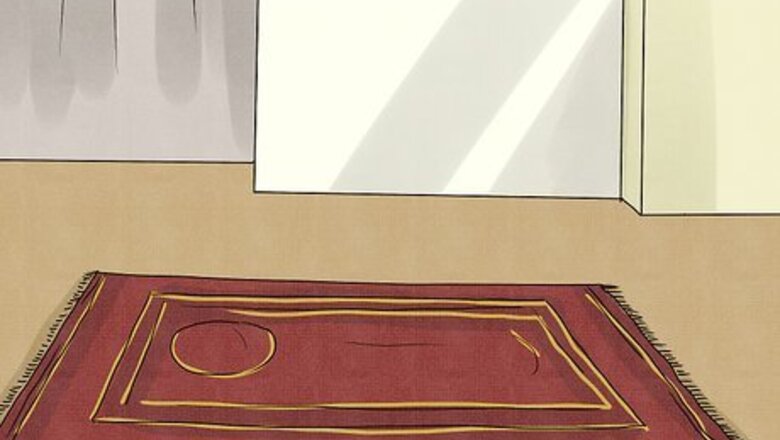
views
Preparing for Prayer
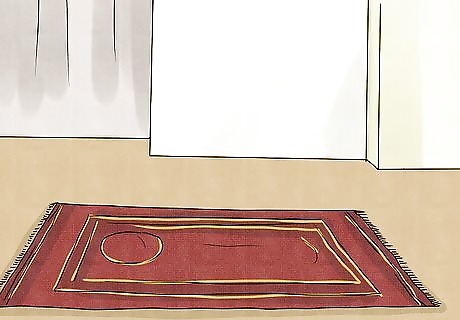
Ensure the area chosen for prayer is clean and free of impurities. This includes your body, your clothes, and the place of prayer itself. Perform wudu. You must be ritually pure before you go start praying. If you're not, it's required to perform wudu (ablution) before you do. If since your last prayer, you have urinated, defecated, passed gas, bled excessively, passed madhy (seminal fluid), or fallen asleep leaning/laying down, you need to perform wudu. If you are praying in a masjid (mosque), which is highly encouraged for men, enter quietly—other Muslims might still be praying and you don't want to disturb them. Many Muslims families keep a dedicated area for salah in their home. If you are unsure of the cleanliness of your area, spread a mat on the floor for good measure. This prayer rug is very important to Islamic culture.
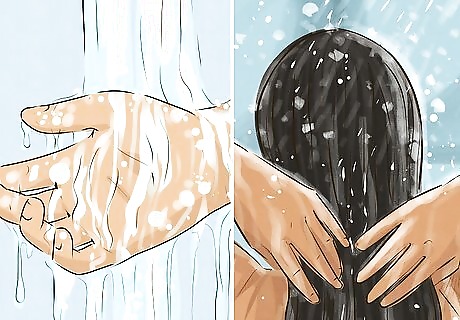
Perform ghusl (full shower) if needed. Certain circumstances will require that you perform ghusl instead of wudu to be fully cleansed by removing najas (impurities) before praying. You need to perform ghusl if you wish to pray after having sexual intercourse, ending your menstruation period or postpartum bleeding, giving birth, having a wet dream or ejaculating with sexual pleasure. To perform ghusl, you must wash your entire body and hair with water. It is recommended that you wash 3 times, making sure every part of the skin has been run under water. Note that when you perform either wudu or ghusl, anything that prevents water from touching the obligatory areas of the body must be removed, including things such as nail polish, accessories, and waterproof mascara. If you do not perform wudu or ghusl when required by the Shariah then the prayer will not be valid and will not be accepted.
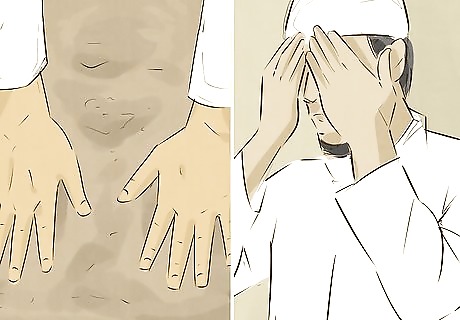
Perform tayammum (dry purification) if needed. If a Muslim is unable to use water, he or she may choose to perform tayammum instead of wudu or ghusl. This rite involves using clean soil or dirt or a natural rock that has not been used before to perform tayammum.
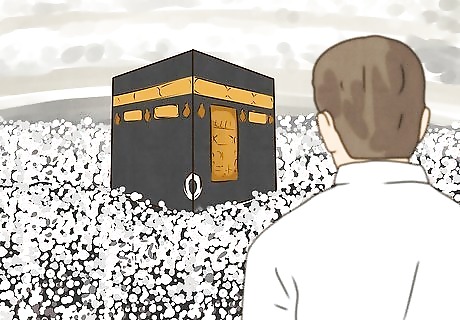
Face the Qibla. This is the direction all Muslims face to turn in prayer towards the Holy Ka'bah. The Holy Mosque in Mecca is the most revered place of worship for Muslims around the entire world. All Muslims are required to face the Ka'bah five times every day when offering their prayers. If you are traveling on a ship or airplane and fear that the time of prayer will end before you reach someplace where you can determine the direction of Ka'bah then, in that case, you can offer Salat without facing Ka'bah. It is Mustahab (recommended) that one face the Ka'bah at least during the takbeer of ihram (saying "Allahu Akbar" at the beginning of Salat).
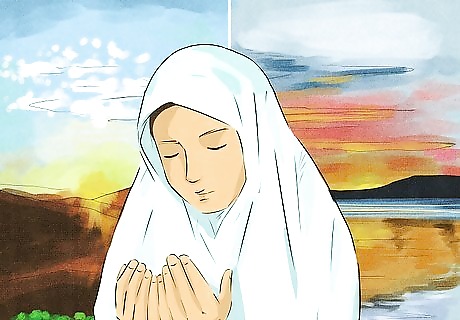
Pray at the proper time. The five prayers of each day take place at very specific times according to one's geographic location and the time of year. For each one, there is a brief period of time it can be performed, determined by the rising and falling of the sun. Each fard salah takes about 5 to 10 minutes from start to finish, but should never be hurried. Try to pray the prayers at the start of the appointed time, as Allaah will appreciate your enthusiasm to pray. The five prayers are Fajr, Zuhr, Asr, Maghrib, and Isha. They are at dawn, afternoon, in the mid-afternoon, at sunset, and at night, respectively. They are not at the same time each day, as they are timed by the sun, which changes path throughout the seasons. Each of the five salah contains a specified number of rak'ah (units), as follows: Obligatory prayers: - Fajr prayer (2 units (Rak'ah)) - Dhuhr prayer (4 units (Rak'ah)) - Asr prayer (4 units (Rak'ah)) - Maghrib prayer (3 units (Rak'ah)) - Isha prayer (4 units (Rak'ah)) Additionally, many Muslims chose to follow the example of Prophet Muhammad (PBUH) by praying additional optional prayers around the obligatory prayers, giving a daily cycle as follows: Fajr - Two rak'ah sunnah mu'akkadah (optional but highly recommended), then two rak'ah fardh (obligatory); Zuhr - Four rak'ah sunnah mu'akkadah (optional but highly recommended), then four rak'ah fardh (obligatory), then two rak'ah sunnah mu'akkdah (optional but highly recommended), then two rak'ah nafl (optional); Asr - Four rak'ah sunnah ghayr mu'akkadah (optional but spiritually beneficial), then four rak'ah fardh (obligatory); Maghrib - Three rak'ah fardh (obligatory), then two rak'ah sunnah mu'akkadah (optional but highly recommended), then two rak'ah nafl (optional); Isha - Four rak'ah sunnah, then four rak'ah fardh (obligatory), then two rak'ah sunnah mu'akkadah (optional but highly recommended), then two rak'ah nafl (optional), then three rak'ah witr (optional but highly recommended), then two rak'ah nafl (optional). Whilst there is no penalty for not performing the sunnah and nafl prayers, they are a gift from Allaah that should be embraced to improve one's connection with Allaah and earn extra rewards. EXPERT TIP Mekaeel Mohsin Mekaeel Mohsin Imam Shaykh Mekaeel is an Imam at the Islamic Community of Salinas in Salinas, California. He is the founder of the Voyagers of Knowledge YouTube channel, which creates Islamic educational content. He attended the Islamic University of Madinah and earned a degree from the school of Da'wah and Usuluddeen. Mekaeel Mohsin Mekaeel Mohsin Imam Do not question rituals. Have you ever wondered why Islamic prayers happen when they do? It's not about what's convenient — it's about committing to your faith. Allah knows best when it's the right time. See them not as hassles but as a thoughtful plan for your spiritual health.

Learn to say prayers in Arabic. Salah must be performed in the Arabic language because this is the language that the Qur’an was revealed in. It also allows Muslims outside of Arabic-speaking countries to recite the prayers and understand what is being said. Speaking all prayers in the same language avoids the confusion of translating words into other languages. Use online sources to help you pronounce the obligatory prayer words, such as Rosetta Stone, Salaam Arabic, hosted by Pangaea Learning, Madinah Arabic or Youtube sources. Take a course in Arabic at your local college. Learn and practice the correct pronunciations with an Arabic speaker as the prayer may be invalid if it is not recited correctly. Non-Arabic speaking children will benefit from attending evening or weekend madrassa classes to learn Arabic and study the Qur'an.
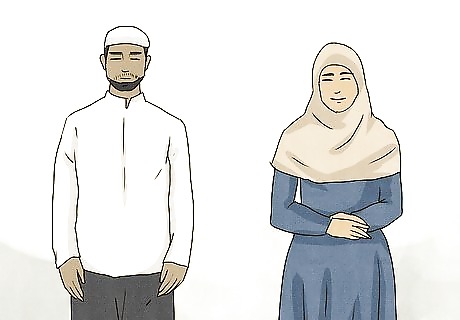
Cover yourself. Men and women must both cover themselves with material that covers the skin throughout the prayer. While women must cover everything but their faces and hands, men must keep the area between their navel and knees covered. The material must cover the body during prayer movements. So if, for example, bending causes a piece of material to slip and expose skin on a woman’s neck, she would need to ensure that her clothing is tucked in properly or put more clothing on before she can start her prayer.
Performing the Muslim Prayers
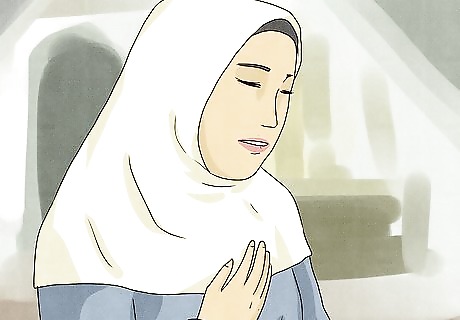
Make your intention known in your heart. Before initiating the salat, it is important that you have the intention to pray. This can be in your own language. For example, you may say (in your heart, not out loud) "I intend to perform two rakats Fajr salah, seeking nearness to Allaah, in obedience to Him".
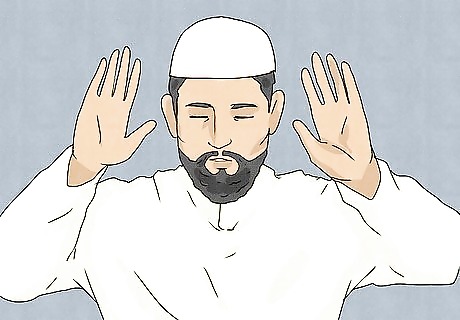
Raise your hands up next to your ears and shoulders, then say Allāhu akbar (الله أَكْبَر). This translates to "Allah is the greatest." Do this while standing (or sitting if you can't stand). The fingers should be spaced when the hands are raised.
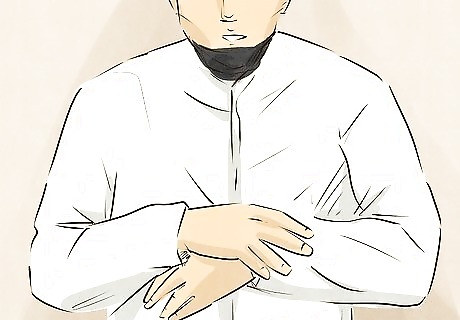
Place your right hand over your left hand. Place your hands either on your navel, on your chest, or between the two; there's a difference of opinion between Islamic schools of thoughts. Keep your eyes focused on the ground. It helps to keep your sight fixed on where your head will rest when prostrating later. Do not let your eyes wander. Recite the optional Istiftah Du'a (opening prayer): Subhanakal-lahummaWabihamdika watabarakas-muka wataaaalaJadduka wala ilaha ghayruk.A’auodu billaahi minash-shaytaanir rajeemBis-millaahir rahmaanir raheem Follow it with Surah Al-Fatiha (this Surah is recited in each Rak'ah):Bismillaahir Rahmaanir RaheemAlhamdu lillaahi Rabbil 'aalameenAr-Rahmaanir-RaheemMaaliki Yawmid-DeenIyyaaka na'budu wa lyyaaka nasta'eenIhdinas-Siraatal-MustaqeemSiraatal-ladheena an'amta 'alaihimGhayril-maghdoobi 'alaihim wa lad-daaalleen Recite any other surah or any part of the Qu'ran, such as Surah Ikhlas:Qul huwal laahu ahadAllah hus-samadLam yalid wa lam yooladWa lam yakul-lahu kufuwan ahad Reciting a surah after Al-Fatiha is only done in the first 2 units (Rakaa's) of fardh salat while in sunnah mu'akkadah it is done in all units (Rakaa's).
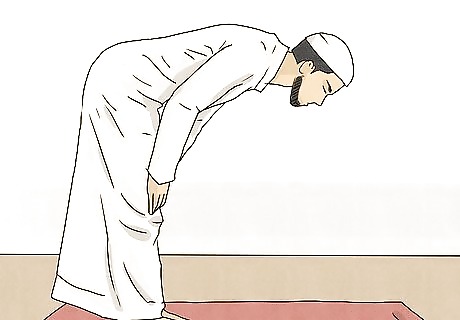
Say "Allahu Akbar" and bend down. Bend your body so that your back and neck are as straight as possible and level with the ground, keeping your eyes focused on the ground and keep your fingers and palm on the knees. Your back and head should be at a 90° angle with your legs. You don't need to make a perfect angle; your body should be relaxed. This position is called ruku. While bowing, say, Subhanna Rabbiyal Adheem three times. This translates to, "Glorious is my Lord the most great."
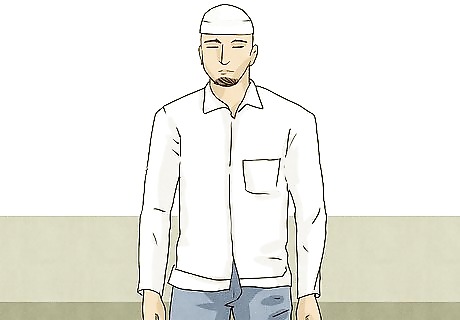
Stand back up (raise from ruku). While rising up recite Samiallah Huliman Hamidah with your arms beside you. This means "Allah hears those who praise Him". While standing up, recite Rabana Walakal Hamd (Our Lord, all praise is for you) once. You can also add Hamdan Katheeran Tayyiban Mubaarakan Feeh" (praise which is abundant, excellent and blessed) after.
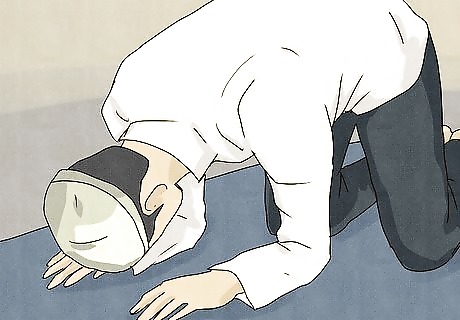
Say Allahu Akbar and prostrate. Place your head, knees and hands on the floor. While "sujood" (prostration) make sure that your forehead and nose touch the ground. This is the position called "sajdah." When you are positioned fully, say Subhanna Rabbiyal A'laa (Glorious is my Lord, the most High) three times. Your forearms should not be on the floor. Your fingers should be together.
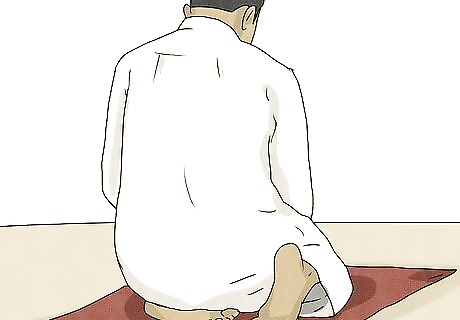
Rise from sajdah and sit on your knees. Place your left foot from ball to heel on the floor. Your right foot should be toes on the floor only. Place your hands flat on your knees. You can recite Allaahumma-ghfir lee warhamnee wajburnee, warfa’nee, wa 'aafinee war'zuqnee (O Allah, forgive me, have mercy on me, strengthen me, raise me in status, pardon me and grant me provision), or If its easier you can say "Rabirghfirlee" (Lord, forgiveme) three times. There are other du'as that you can recite in this position, such as Allahuma-ghfirlee twice (O Allah, forgive me). Return to sajdah and say Subhanna Rabbiyal a'laa three times.

Say Allahu akbar and stand up. You have completed one rak'ah. Depending on the salah, you may need to complete up to three more. In every second rak'ah, after the second sajdah, sit on your knee again. Recite: Tashahhud: At-tahiyyaatu Lillaahi was-salaawaatu wat-tayyibaat. As-salaamu ‘alayka ayyuhan-Nabiyyu wa rahmatullaahi wa barakaatuhu. As-salaamu ‘alayna wa ‘ala ‘ibaad-illaah-his-saaliheen. Ash-hadu al-aa ilaaha ill-Allaah wa ash-hadu anna Muhammadan ‘abduhu wa rasooluhu "All compliments, prayers and pure words are due to Allaah. Peace be upon you, O Prophet, and the mercy of Allaah and His blessings. Peace be upon us and upon the righteous slaves of Allaah. I bear witness that there is no god except Allaah and I bear witness that Muhammad is His slave and Messenger". Durood: Allaahumma salli ‘ala Muhammad, wa ‘ala aali Muhammad, kama sallayta ‘ala Ibraaheem, wa ‘ala aali Ibraaheem, fil aalameen innak hameedun majeed, wa baarik ‘ala Muhammad, wa ‘ala aali Muhammad, kama baarakta ‘ala Ibraaheem, wa ‘ala aali Ibraaheem, fil aalameen innak hameedun majeed "O Allaah, send prayers upon Muhammad and upon the family of Muhammad, as You sent prayers upon Ibraaheem and the family of Ibraaheem, You are indeed Worthy of Praise, Full of Glory. O Allaah, bless Muhammad and the family of Muhammad as You blessed Ibraaheem and the family of Ibraaheem, You are indeed Worthy of Praise, Full of Glory".
Finish the prayer with tasleem. After the tashahhud, durood, and any du'a
Turning your head to the right and saying, As-salamu alaykum wa Rahmatullahi wa Barakaatuhu. The angel who records your good deeds is to this side. Turning your head to the left and saying, As-salamu alaykum wa Rahmatullahi wa Barakaatuhu. The angel who records your wrongful deeds is to this side. The prayers have ended! Another variation of the tasleem is by saying As-salamu alaykum wa Rahmatullah.










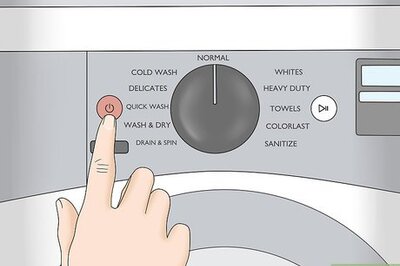









Comments
0 comment